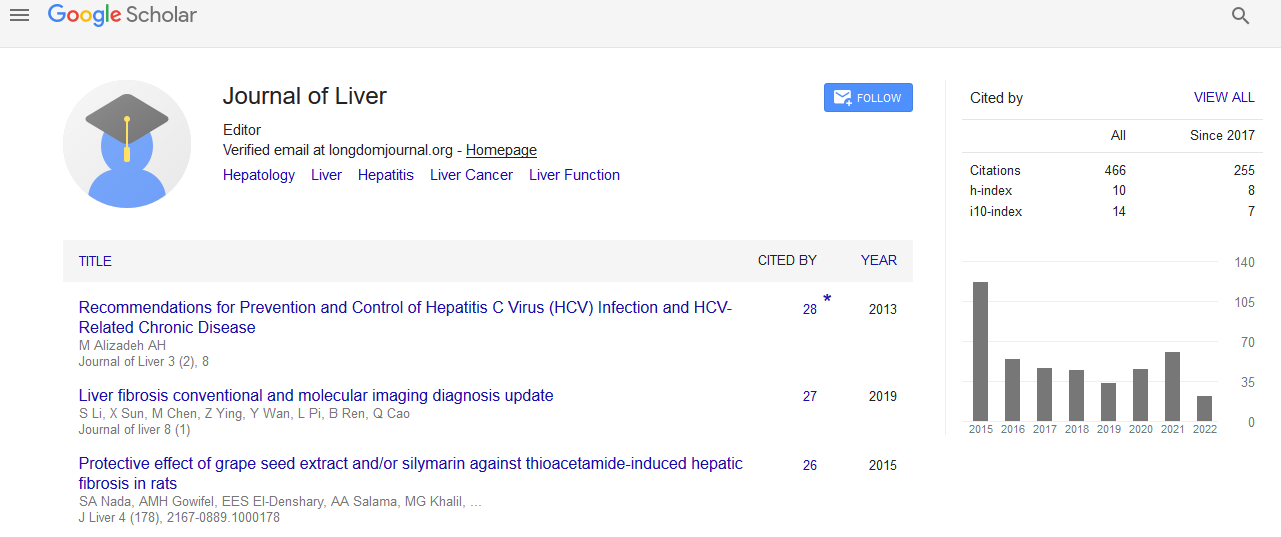PMC/PubMed Indexed Articles
Indexed In
- Open J Gate
- Genamics JournalSeek
- Academic Keys
- RefSeek
- Hamdard University
- EBSCO A-Z
- OCLC- WorldCat
- Publons
- Geneva Foundation for Medical Education and Research
- Google Scholar
Useful Links
Share This Page
Journal Flyer

Open Access Journals
- Agri and Aquaculture
- Biochemistry
- Bioinformatics & Systems Biology
- Business & Management
- Chemistry
- Clinical Sciences
- Engineering
- Food & Nutrition
- General Science
- Genetics & Molecular Biology
- Immunology & Microbiology
- Medical Sciences
- Neuroscience & Psychology
- Nursing & Health Care
- Pharmaceutical Sciences
To study the value of first day bilirubin in predicting development of significant hyperbilirubinemia in healthy term neonates
2nd International Conference on Hepatology
May 09-11, 2016 Chicago, USA
Krutika A Kurhade, Ritika Khare and Sadhana Purandare
Datta Meghe Institute of Medical Sciences, India
Scientific Tracks Abstracts: J Liver
Abstract:
In this prospective observational study, the value of first day bilirubin in predicting development of significant hyperbilirubinemia in healthy term neonates was evaluated in the maternal and neonatal wards of AVBR hospital, Sawangi, Wardha. The study included 388 full term healthy neonates out of 6082 deliveries in study period. Newborns with Rh incompatibility, prematurity etc. were excluded. Transcutaneous bilirubin (TCB) was measured on 12, 24, 48 and 72 hours of life. To assess the correlation between TCB and serum bilirubin, blood was sent to the biochemistry laboratory for measuring serum bilirubin levels (at 72 hours of life) by modified Van den Bergh's test. There were 193 cases of neonatal hyperbilirubinemia out of 388 cases (49.74%). We determined a cut off value of 5 mg/dl for the prediction of neonatal hyperbilirubinemia at 24 hours of life (NPV=77). The mean value of bilirubin at 12, 24, 48 and 72 hours was found as 3.69, 5.17, 9.05 and 13.18 respectively. Neonatal hyperbilirubinemia was found to be more on 24 and 72 hours (49.74%) as compared to 12 hours (35.2%) and 48 hours (44.32%). Average values of bilirubin in newborns developing hyperbilirubinemia at 12, 24, 48 and 72 hours were 5.02, 6.88, 12.15 and 16.95 respectively. A TCB measurement of 5 mg/dl in first 24 hours of life predicted nearly all the term newborns had hyperbilirubinemia (�?�13) mg/dl at 72 hours of life. A TCB measurement of 4 mg/dl at 12 hours predicted 35.56% of the cases who developed hyperbilirubinemia at 72 hours of life. Correlation of TCB and serum bilirubin was found to be significant (correlation coefficient (r) 0.9379). First day TCB level can predict development of subsequent hyperbilirubinemia.
Biography :
Krutika A Kurhade is a 2nd year resident in the Department of Paediatrics in DMIMS, Sawangi, Meghe. She worked as a Clinical Observer in Paediatrics in Eric Williams Medical Sciences Complex Trinidad & Tobago, UWI and in Lad Child Care Hospital, Nagpur, Mahrashtra, India. She also worked as a House Officer in the MICU of IGGMC, Nagpur, India. She has attented various social health camps in the Vidarbha region, presented a paper and case presentation in two national level conferences. She has also attended many other national level CMEs and conferences on topics of nutrition, neurology and genetics.
Email: krutika_88@hotmail.com

